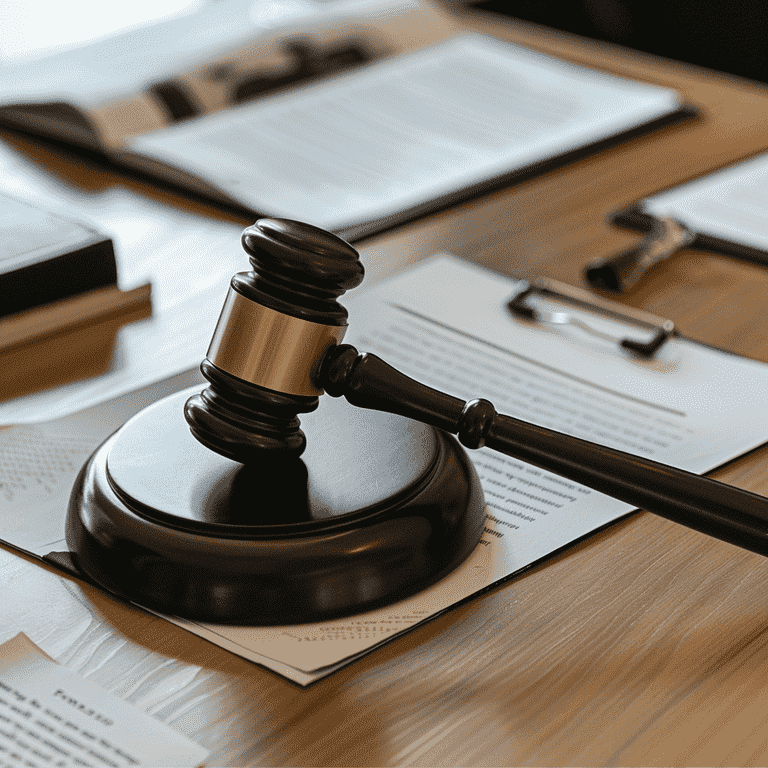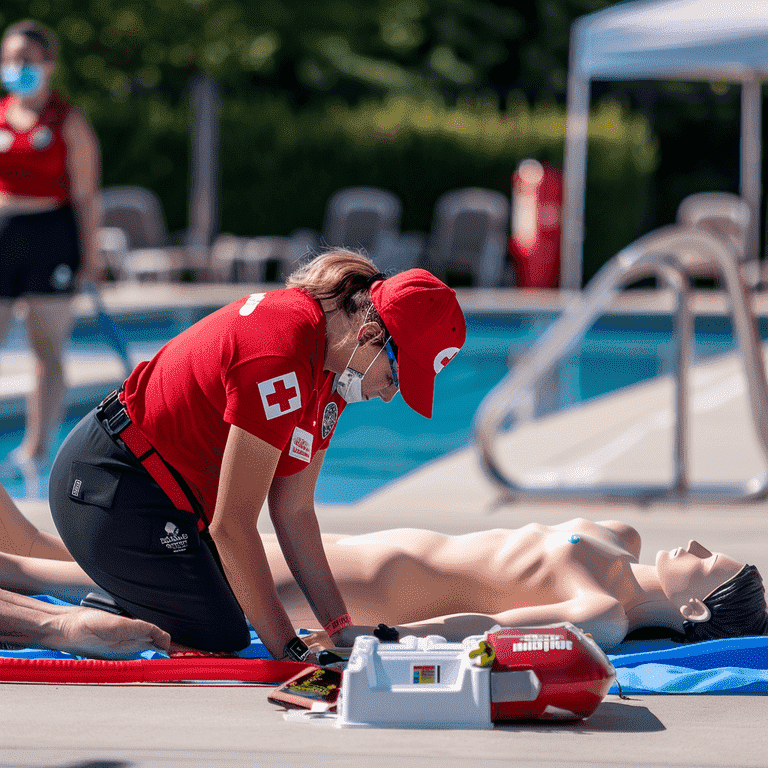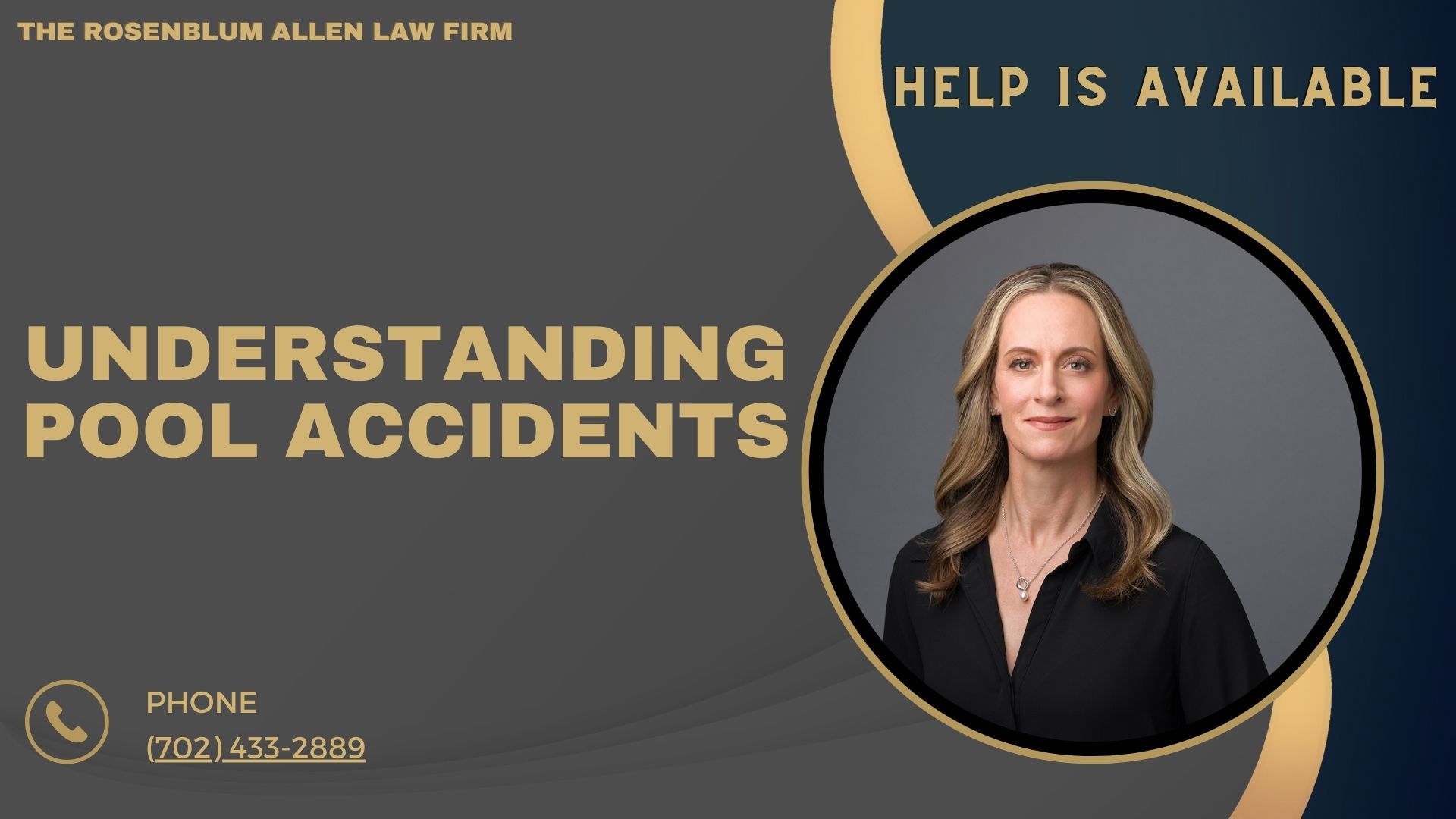Pool accidents are a severe concern, affecting people of all ages. Whether at a public pool, a private backyard oasis, or a hotel, understanding how these accidents happen and how to prevent them is crucial. This article will explore the common causes of pool accidents, effective prevention strategies, and the legal implications that follow such incidents.
 Common Causes of Pool Accidents
Common Causes of Pool Accidents
Drowning
Drowning is the most serious and often fatal pool accident. It can happen in mere seconds and often silently.
Lack of Supervision
Children and even adults can quickly get into trouble in the water. Without proper supervision, the risk of drowning increases significantly.
Inability to Swim
Many drowning incidents involve individuals who cannot swim or overestimate their swimming abilities.
Slip and Fall Incidents
Wet surfaces around the pool area can be very slippery.
Wet Surfaces
Pools are naturally surrounded by water. This makes the surrounding surfaces slippery and prone to causing falls.
Improper Footwear
Wearing shoes without proper grip can increase the risk of slipping and falling.
Diving Accidents
Diving can be fun but also dangerous if not done correctly.
Shallow Water
Diving into shallow water can lead to severe head, neck, and spinal injuries.
Incorrect Diving Techniques
Improper diving techniques can result in accidents, even in deeper water.
Electrical Hazards
Pools and electricity can be a deadly combination.
Faulty Pool Lights
Improperly maintained or faulty pool lights can pose an electrocution risk.
Improperly Installed Electrical Equipment
Electrical equipment not installed to safety standards can lead to severe accidents.
Entrapment and Evisceration
This is a lesser-known but severe risk associated with pools.
Pool Drains and Suction Fittings
Powerful suction from pool drains can trap swimmers, leading to injuries or drowning.
Broken or Missing Drain Covers
Drain covers are essential safety features. When they are broken or missing, the risk of entrapment increases.

Prevention Strategies for Pool Accidents
Supervision and Safety Protocols
Ensuring constant supervision and implementing safety protocols can significantly reduce the risk of pool accidents.
Lifeguards
Professional lifeguards are trained to monitor and respond to emergencies quickly.
Designated Adult Supervisors
For private pools, having a designated adult supervisor can help maintain safety.
Swimming Lessons
Teaching people how to swim is one of the most effective prevention measures.
For Children and Non-Swimmers
Swimming lessons should be a priority for children and anyone who cannot swim.
Regular Refresher Courses
Experienced swimmers can benefit from regular refresher courses to keep their skills sharp.
Pool Area Maintenance
Regular maintenance of the pool area is essential to prevent accidents.
Regular Cleaning and Inspection
Keeping the pool area clean and regularly inspecting for hazards can prevent slip and fall incidents.
Non-Slip Surfaces
Installing non-slip surfaces around the pool can reduce the risk of falls.
Proper Diving Techniques and Warnings
Educating swimmers about safe diving practices is crucial.
Depth Markers
Marked depth indicators help swimmers know where it is safe to dive.
No Diving Signs in Shallow Areas
Posting “No Diving” signs in shallow areas can prevent diving accidents.
Electrical Safety Measures
Ensuring electrical safety around the pool area is vital.
Regular Inspections by Certified Electricians
Having a certified electrician inspect the pool’s electrical systems regularly can prevent electrical hazards.
Use of Ground-Fault Circuit Interrupters (GFCIs)
GFCIs can quickly cut off power in an electrical fault, preventing electrocution.
Safety Equipment
Having the proper safety equipment on hand can save lives.
Pool Covers and Fences
Pool covers and fences can prevent unsupervised access to the pool, especially for young children.
Pool Alarms and Flotation Devices
Pool alarms can alert when someone enters the pool area, and flotation devices can provide immediate help in an emergency.

Legal Implications of Pool Accidents
Pool accidents can have serious legal consequences. Understanding these implications can help you protect yourself and others.
Liability Issues
When a pool accident occurs, determining who is liable is crucial.
Homeowner Responsibilities
Homeowners with private pools must ensure their pool is safe. This includes:
- Installing fences and covers.
- Supervising guests.
- Maintaining the pool and surrounding area.
Please do so to avoid liability if an accident happens.
Public Pool Operator Responsibilities
Public pool operators have a higher duty of care. They must:
- Employ trained lifeguards.
- Conduct regular safety inspections.
- Ensure the pool meets all safety standards.
Negligence can lead to severe legal consequences.
Personal Injury Claims
If someone is injured in a pool accident, they may file a personal injury claim.
Process of Filing a Claim
The injured party must:
- Prove the pool owner/operator was negligent.
- Show that this negligence caused their injury.
Types of Compensation Available
Compensation may include:
- Medical expenses
- Lost wages
- Pain and suffering
Wrongful Death Claims
In tragic cases where a pool accident results in death, the family may file a wrongful death claim.
Legal Steps to Take
The family must:
- Prove the death was due to negligence.
- Show the financial and emotional impact of the loss.
Compensation for Surviving Family Members
Compensation can cover:
- Funeral expenses
- Loss of income
- Emotional distress
Insurance Considerations
Insurance plays a crucial role in pool accident cases.
Homeowner’s Insurance Policies
Homeowners should ensure their policy covers pool accidents. This may include:
- Liability coverage
- Medical payments coverage
Public Liability Insurance for Pool Operators
Public pool operators should have comprehensive insurance. This protects against claims arising from accidents and injuries.

First Aid and Emergency Response for Pool Accidents
Quick response is crucial in pool accidents. Knowing first aid can save lives.
Immediate Actions
Checking for Responsiveness
- Tap the person and shout to see if they respond.
- If unresponsive, call for emergency help immediately.
Calling Emergency Services
- Dial emergency services and provide precise details.
- Stay on the line and follow instructions.
CPR and Rescue Breathing
Knowing CPR can make a critical difference.
Steps to Perform CPR
- Place the person on their back.
- Tilt their head back to open the airway.
- Pinch their nose and give two breaths.
- Begin chest compressions – 30 compressions followed by two breaths.
- Continue until help arrives.
Importance of Timely Intervention
Immediate CPR can double or triple the chances of survival—every second counts.
Handling Non-Drowning Incidents
Pool accidents aren’t just about drowning. Other injuries need prompt care.
Managing Fractures and Sprains
- Immobilize the injured area.
- Apply ice to reduce swelling.
- Seek medical help.
Treating Electrical Burns and Shocks
- Turn off the power source.
- Do not touch the person with bare hands.
- Call emergency services immediately.
- Cover burns with a sterile dressing.

Impact of Pool Accidents on Victims and Families
Pool accidents can have long-lasting effects. They impact not just the victim but their families as well.
Physical Consequences
Long-Term Injuries
Pool accidents can lead to severe injuries, such as:
- Brain damage from near-drowning.
- Permanent spinal injuries from diving accidents.
Rehabilitation Needs
Victims may require extensive rehabilitation, including:
- Physical therapy
- Occupational therapy
- Speech therapy
Psychological Effects
Trauma and PTSD
Experiencing or witnessing a pool accident can cause:
- Anxiety
- Depression
- Post-traumatic stress disorder (PTSD)
Counseling and Support Groups
Seeking professional help can aid recovery. Support groups can provide comfort and shared experiences.
Financial Burden
Medical Expenses
Treatment for injuries can be costly, including:
- Emergency care
- Ongoing therapy
- Medications
Loss of Income
Victims and their families may face:
- Lost wages due to inability to work
- Financial strain from medical bills

Breaking It All Down
Understanding pool accidents and their implications is vital. Awareness of the causes, implementation of prevention strategies, and knowledge of the legal and emergency steps can help ensure pool safety. Remember, preparation and vigilance are vital to preventing accidents and minimizing their impact.

Frequently Asked Questions
What are the most common pool accident injuries?
Common pool accident injuries include drowning, head and spinal injuries from diving, slip and fall injuries, and electrical shocks.
How can I make my home pool safer for children?
To make your home pool safer for children, install a fence around the pool, use a pool cover, have a designated adult supervisor, and ensure children take swimming lessons. Additionally, keep rescue equipment and a phone nearby in case of emergencies.
What steps should I take if I witness a pool accident?
If you witness a pool accident, immediately check for responsiveness, call emergency services, and begin first aid or CPR if necessary. Stay with the victim until help arrives and follow the instructions of emergency responders.
Are there specific laws regulating pool safety?
Yes, there are specific laws and regulations regarding pool safety. These vary by location but typically include requirements for fencing, signage, and regular safety inspections for public pools. Private pool owners should also comply with local safety codes.
How can public pools ensure the safety of their patrons?
Public pools can ensure safety by employing trained lifeguards, conducting regular safety inspections, maintaining proper water quality, and providing clear safety signage. Additionally, they should enforce pool rules and ensure all equipment is in good working condition.
What should be included in a pool safety plan?
A comprehensive pool safety plan should include supervision protocols, emergency response procedures, regular maintenance schedules, safety equipment checks, and guidelines for pool users, such as no diving in shallow areas and no running around the pool.
How can I prevent electrical hazards in my pool?
Prevent electrical hazards by ensuring all pool lights and electrical equipment are installed and regularly inspected by certified electricians. Use ground-fault circuit interrupters (GFCIs) and keep all electrical devices away from the pool area.
What insurance coverage should a pool owner have?
Pool owners should have liability coverage and medical payments coverage as part of their homeowner’s insurance policy. Public pool operators should have comprehensive public liability insurance to cover potential accidents and injuries.
How can someone seek compensation after a pool accident?
To seek compensation after a pool accident, the injured party or their family should consult with a personal injury attorney. They will need to prove negligence on the part of the pool owner or operator and demonstrate how the accident caused their injuries.
What are the signs of drowning to watch for?
Signs of drowning include struggling to keep the head above water, gasping for breath, inability to call for help, flailing arms, and an upright body position with no forward progress. Drowning can happen silently, so constant supervision is essential.
What role do support groups play in recovery after a pool accident?
Support groups can provide emotional support, share coping strategies, and offer a sense of community for victims and their families. They can be an essential part of the recovery process, helping individuals deal with trauma and emotional distress.
What should I do if a pool drain cover is broken or missing?
If a pool drain cover is broken or missing, do not use the pool until it is replaced. Pool drain covers are critical for preventing entrapment and evisceration. Contact a professional to repair or replace the cover immediately.
How often should I inspect my pool area for hazards?
Regular inspections of your pool area should be conducted at least once a month. Additionally, inspect the pool area after severe weather or heavy usage to ensure there are no new hazards. Regular maintenance checks can help prevent accidents.
What are the psychological effects of a near-drowning experience?
A near-drowning experience can lead to psychological effects such as anxiety, depression, and post-traumatic stress disorder (PTSD). Victims may need counseling and support to help them cope with the trauma and emotional impact of the incident.
How can pool operators ensure compliance with safety standards?
Pool operators can ensure compliance by regularly reviewing and adhering to local and national safety standards, conducting regular training for staff, performing routine inspections, and promptly addressing any safety concerns or violations.

Additional Resources for You from The Rosenblum Allen Law Firm.
Criminal Defense Attorneys
If you or a loved one is facing criminal charges, our experienced criminal defense attorneys can help. Learn more about how we can assist you: Criminal Defense Attorneys
Las Vegas DUI Lawyer
Facing a DUI charge can be overwhelming. Our dedicated DUI lawyers in Las Vegas are here to defend your rights and provide the best possible outcome. Find out more: Las Vegas DUI Lawyer
Domestic Violence Lawyer Las Vegas
If you are dealing with domestic violence allegations, our compassionate and skilled attorneys can provide the support and defense you need. Get the details: Domestic Violence Lawyer Las Vegas
Drug Possession Lawyer
Drug possession charges can have serious consequences. Our knowledgeable drug possession lawyers can help protect your rights and future. Learn more: Drug Possession Lawyer
Sex Crimes Attorney
Being accused of a sex crime is a serious matter. Our experienced sex crimes attorneys are here to provide a strong defense and support. Find out how we can help: Sex Crimes Attorney
CPS Defense Attorney
If you are facing allegations from Child Protective Services, our CPS defense attorneys can help you navigate the complex legal process. Learn more: CPS Defense Attorney
Misdemeanor Lawyer
Misdemeanor charges can still have significant impacts on your life. Our misdemeanor lawyers are here to defend your rights and achieve the best possible outcome. More information here: Misdemeanor Lawyer
Las Vegas Warrant Defense Attorney
If you have an outstanding warrant in Las Vegas, our warrant defense attorneys can help resolve the issue and protect your rights. Find out more: Las Vegas Warrant Defense Attorney
Las Vegas Probation Violation Attorney
Violating probation can lead to serious consequences. Our probation violation attorneys in Las Vegas are here to help you navigate the legal challenges. Learn more: Las Vegas Probation Violation Attorney
Theft Crime Defense Lawyer
Facing theft crime charges? Our experienced theft crime defense lawyers are ready to defend your rights and achieve the best possible outcome. More information: Theft Crime Defense Lawyer
Kidnapping Lawyers
Kidnapping charges are extremely serious. Our kidnapping lawyers provide strong defense and support throughout the legal process. Learn more: Kidnapping Lawyers
Juvenile Defense Lawyers
If your child is facing legal issues, our juvenile defense lawyers are here to provide compassionate and effective representation. Find out how we can help: Juvenile Defense Lawyers
Firearms Lawyer Las Vegas
Facing firearms-related charges? Our firearms lawyers in Las Vegas can provide the defense you need to protect your rights and future. More details: Firearms Lawyer Las Vegas

Offsite Resources for You
Centers for Disease Control and Prevention (CDC)
- The CDC offers extensive information on pool safety, drowning prevention, and health guidelines for swimming pools. Visit their home page for more details: CDC
American Red Cross
- The American Red Cross provides resources on swimming safety, first aid, and CPR training. They offer courses and guidelines to help you stay safe around water. Learn more here: American Red Cross
Safe Kids Worldwide
- Safe Kids Worldwide focuses on preventing childhood injuries, including those related to swimming and pool safety. Explore their resources and safety tips: Safe Kids Worldwide
National Safety Council (NSC)
- The NSC offers information on a wide range of safety topics, including swimming pool safety and injury prevention. Check out their home page for more information: National Safety Council
Consumer Product Safety Commission (CPSC)
- The CPSC provides guidelines and safety standards for pool and spa safety, including information on entrapment hazards and safety equipment. Visit their home page: CPSC
Pool Safely
- Pool Safely is a campaign by the CPSC aimed at preventing pool and spa drownings and entrapments. They offer safety tips, resources, and educational materials. Learn more here: Pool Safely
National Drowning Prevention Alliance (NDPA)
- The NDPA is dedicated to reducing the incidence of drowning and aquatic injuries. They provide resources, education, and support for water safety. Visit their home page: NDPA

A Special Message from Our Lead Attorney, Molly Rosenblum Allen, Esq

Thank you for taking the time to read through these resources. I hope you found the information helpful and informative. If you have any questions or need assistance, please don’t hesitate to reach out. My team and I are here to support you and provide your guidance. Call us at (702) 433-2889 to get the ball rolling on your case.
We look forward to helping you navigate this challenging time.
Warm regards,
Molly Rosenblum Allen, Esq.






